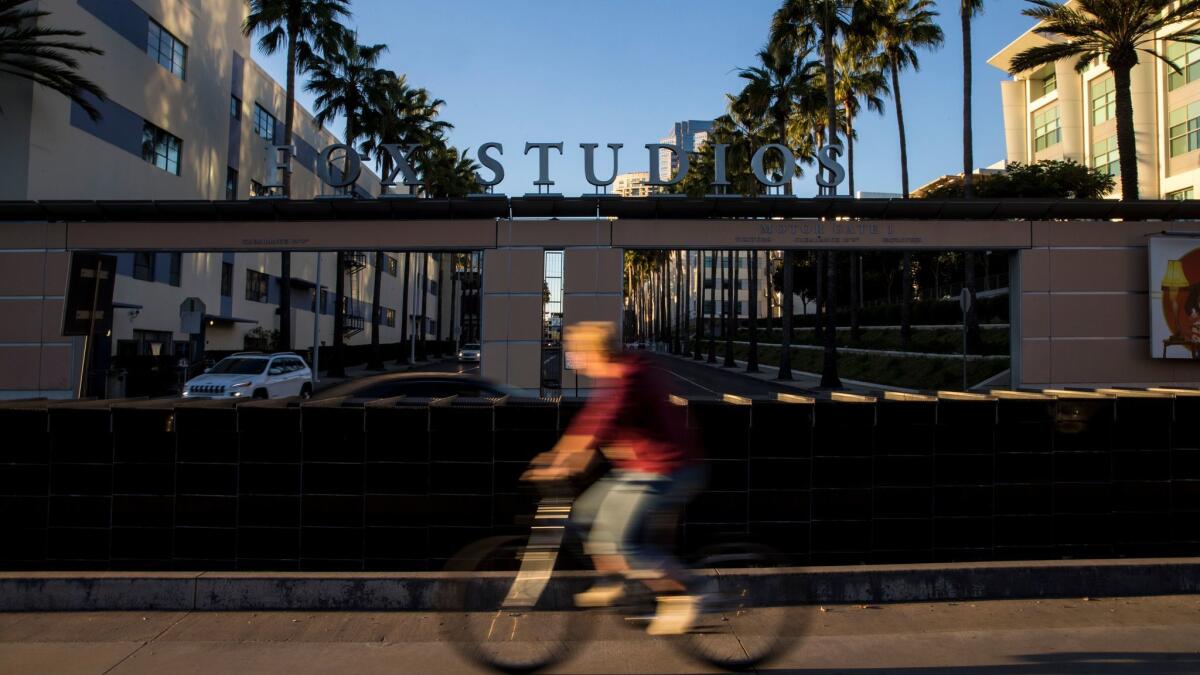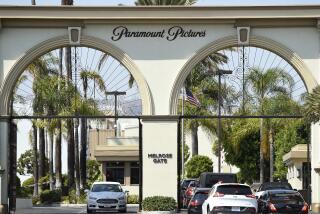Why Rupert Murdoch is keeping the Fox lot in Century City even as he sells to Disney

Fox’s decision to hang onto its historic Century City studio lot even as it sold much of its assets to Disney in this week’s blockbuster $52.4-billion deal is a testament to the enduring value of the movie factories dreamed up a century ago by Hollywood pioneers.
Internet streaming services such as Netflix and Amazon are cranking out movies and television shows at an increasing pace, competing for sound stages with old-line studios and relatively younger players such as HBO and Showtime.
The location of the 2-million-square-foot lot on the Westside, where many people working in entertainment and technology live, also makes it especially valuable, real estate experts said — a jewel Rupert Murdoch would understandably be loath to part with.
Indeed, Fox laid the foundation for a major expansion of the West Pico Boulevard lot last year when it filed a proposal with the city planning department to add more than 1 million square feet of offices, sound stages and other production and support facilities over the next 20 years.
It’s unclear whether Fox will pursue the expansion, which is undergoing a lengthy environmental review. But there is not expected to be vacancies at the lot due to Walt Disney Co.’s acquisition of the 20th Century Fox movie and television studio and other Fox assets.
Peter Rice, president of corporate parent 21st Century Fox, told employees at a town hall meeting after the deal was announced that Disney will lease the storied lot for seven years. That means employees in businesses that Disney is buying as well as those that will remain part of the slimmed-down Fox will be staying put for now.
The lot features 15 sound stages that are mostly occupied with TV productions. Shows that have recently filmed there include Fox’s “The Orville,” ABC’s “Modern Family” and CBS’ “Life in Pieces.” The latter two shows are 20th Century Fox productions but air on other networks. Fox’s “The Simpsons” has been based on the lot for decades.
In the past, non-Fox productions have leased sound stage space, including “House,” which aired on Fox but was produced by NBC Universal. But today, the lot is almost exclusively occupied by Fox TV production
Typically, production companies rent sound stages and other studio facilities on a project-by-project basis, and demand is robust. Los Angeles-area sound stages were 96% occupied last year, according to FilmL.A., which tracks production.
“High occupancy is a good thing for studios, as it means there are more paying tenants,” FilmL.A. said in a report. “From this perspective, 2016 was a very good year.”
The production boom even extends to social-media companies such as Snap Inc., the Venice parent of Snapchat, which is expected to start creating its own original, scripted content. It’s also goosing the real estate market outside of studio lots as new players soak up commercial space.
Netflix now occupies more than 500,000 square feet of office and studio space in Hollywood. Hulu rents nearly 200,000 square feet in Santa Monica, YouTube is operating more than 300,000 square feet in Playa Vista and Amazon recently leased more than 280,000 square feet in Culver City.
The office market might soften a bit because of the Disney deal. Fox leases about 400,000 square feet in an office building in Century City next to the lot. That rental space is “most at risk” of being reduced, according to a new report by Bank of America Merrill Lynch, because Disney may want to shrink its office space related to movies and TV networks as it consolidates following the acquisition.
Fox’s studio, however, is a golden business asset. By hanging onto its lot with its stages, theaters and editing bays, Fox can continue to generate substantial income for itself while its property increases in value, said real estate broker Carl Muhlstein of JLL.
Historic Hollywood movie lots that fell out of favor and into decay in the late 20th century have come roaring back.
The 15-acre Hollywood Center Studios, where comedy daredevil Harold Lloyd and budding tycoon Howard Hughes filmed movies, sold for $200 million in May to Los Angeles independent studio operator Hudson Pacific Properties Inc.
Hudson Pacific said it will continue to rent out sound stages and other production facilities there while planning a major addition including offices, parking and infrastructure valued at more than $50 million.
Among the company’s biggest clients is Netflix, which leased an entire 14-story office building that Hudson Pacific recently completed on its Sunset Bronson lot in Hollywood. The video-streaming giant also will occupy another five-story building under construction there, as well as multiple stages and production offices.
That kind of demand was one factor in leading broadcast giant CBS Corp. to ponder the sale of its 65-year-old Television City studio complex in the Fairfax district. It reportedly has received unprompted interest among potential buyers.
Some prospective buyers are considering maintaining TV production operations there and turning its acres of surface parking lots into stores, offices and underground parking or multilevel garages, if city officials approve.
Speculation of Television City’s value runs as high as $900 million, and its footprint is less than half the size of Fox Studios’ 53 acres.
“I can’t even imagine how valuable Fox Studios would be” in a sale, Muhlstein said.
Were it not for “Cleopatra,” Fox Studios might be even more valuable real estate. Costly production of the epic movie starring Elizabeth Taylor and Richard Burton followed a string of expensive flops and, desperate for cash, studio bosses soon sold nearly 180 acres in 1961 to developer William Zeckendorf and Aluminum Co. of America, also known as Alcoa.
The back lot where Shirley Temple pouted and scores of movies such as “Peyton Place” were filmed was no more.
The new owners conceived Century City as “a city within a city” with office towers, residences, restaurants, shopping, theaters and hotels.
Entertainment, meanwhile, is poised to become even more dominant in Southern California in years ahead, Muhlstein said.
“This is the new aerospace- defense of our economy,” he said.
Twitter: @rogervincent
Twitter: @DavidNgLAT








